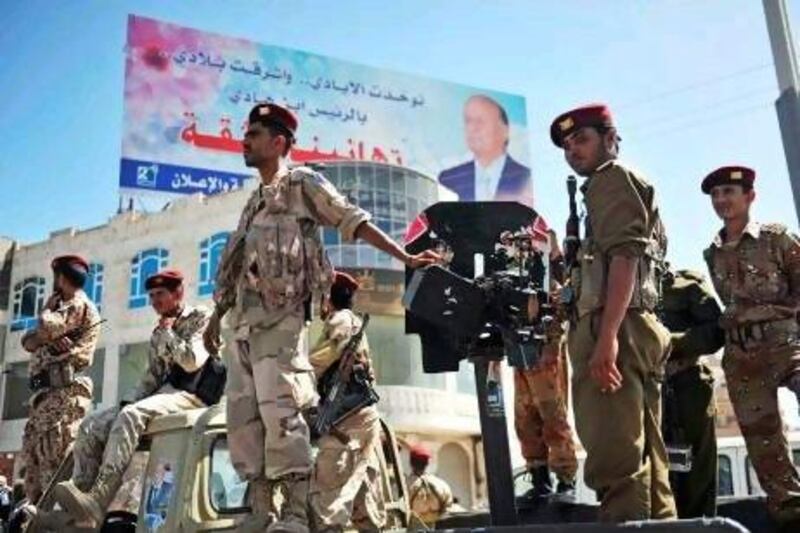SANAA // Reforming the military and instilling security in the country are at the top challenges facing Yemen's new president, Abdrabu Mansur Hadi, according to experts on Yemeni politics.
Mr Hadi took over from the former president, Ali Abdullah Saleh, at the end of February as part of a power-transfer deal aimed at ending the country's political turmoil.
But while Mr Saleh is out of office, many Yemenis worry that he will wield power through his long-time tribal allies in the military and well-placed family members such as his son and nephew who hold powerful security and military posts.
Fuad Al Salahi, a professor of political sociology at Sanaa University, said the military and tribal militia first needed to be removed from the city streets, the site of year-long violent protests against Mr Saleh, before any political reform can happen.
"This requires rival forces under the command of the elected president and defence minister," said Mr Al Salahi.
Gregory Johnsen, with the Near Eastern Studies department at Princeton University in the United States, said he expects the reform of the army will be tricky as is it touches on tribes and patronage - pillars that supported Mr Saleh's power base. The US, which backed the power transfer deal brokered by the Gulf Cooperation Council, is expected to play a role in the reform process.
But, said Mr Johnsen, fixing the problems "requires an encyclopaedic knowledge of the tribes and personalities involved, and nothing I have seen from the US suggests that it has even close to this amount of knowledge".
Yemen's regular military has been fractured by the year-long uprising, with some units defecting to join the opposition.
Yet the Republican Guards and special forces, the best trained and equipped military units in the country, have remained loyal to the government as has the Central Security forces. As the Guards continue to be led by Mr Saleh's son, Ahmed, and the Central Security forces by his nephew, Yahia, there are concerns the former president will retain his influence over the military. Mr Saleh remains in the country, although his aides said last week that he is planning to go into exile in Ethiopia.
On the side of the opposition, Maj Gen Ali Mohsin Al Ahmar, who defected last March to support the protest movement, runs the First Armoured Division. In September, troops from each side engaged in deadly clashes on the streets of Sanaa.
During his visit to Sanaa last month, John Brennan, the US deputy national security adviser, said that "the Yemeni armed forces cannot be a collection of individual fiefdoms. There has to be a strong command and control system to make sure that the Yemeni armed forces truly are a national military".
Mr Brennan sent a clear message to the rival commanders to put their political agenda aside, adding "that the time has come for the Yemeni military to be able to be a unified,disciplined, and professional organisation".
Mr Hadi last week moved to fulfil part of his inauguration pledge by removing the top commander of the southern region, Gen Mahdi Maqoula, a Saleh loyalist.
Military officers have been demanding Gen Maqoula's removal, after alleging that he hindered supplies to the armed forces in the south which are battling Al Qaeda militants. Al Qaeda-linked militants have taken advantage of the security vacuum and imposed control over towns and territory in the lawless south.
Mr Hadi also named a new governor and police chief to the southern city of Aden.
Corruption in Yemen's military is known to be rampant. Soldiers are usually paid by their division commanders, who have a reputation for money skimming.
Hundreds of air force soldiers and officers have staged sit-ins, marches and protests demanding the outster of their commander, Mohammed Saleh Al Ahmar, the former president's half-brother, who they accuse of corruption and repression.
Strikes protesting corruption have spread across other military and government departments in the country during the past two months.
Majed Al Madhaji, a freelance writer who follows Yemeni politics, said rival commanders such as Ahmed Saleh and General Al Ahmar wield more power over the military than Mr Hadi because each division acts as if it was an independent militia loyal to its commander.
"Both Ali Mohsen and Ahmed Saleh will stand as representatives of the old regime formula and protect the same interests of the traditional power centres. Without removing them from their positions, restructuring of the army remains just talk," Mr Al Madhaji said.
"Their control over the army, which is the source of their influence, makes Hadi's popular legitimacy toothless and impotent, which is not good for him before the army and the broad public that voted for him," said Mr Al Madhaji.
Mr Al Madhaji added that "the unprecedented and exceptional support to Hadi by the international community would be an important tipping card that he should shrewdly use to impose his reform agenda".
* With an additional report from Associated Press
Follow
The National
on
[ @TheNationalUAE ]
& Mohammed Al Qadhi on
[ @mohammedalqadhi ]





